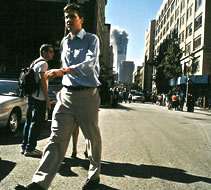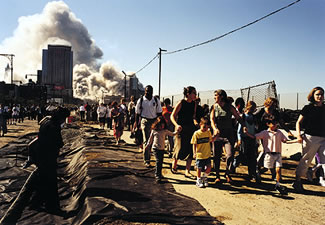 I
landed in Tel Aviv aboard a plane from Newark airport, exactly nine days
after the World Trade Center disaster and after three flight cancellations
by an airline that was more eager to reestablish its domestic flights
than to tend to its international routes. The cab from the airport drove
into Tel Aviv through the "Shalom" highway entrance, slipping
past the two tallest business towers in the Middle East, fleetingly recalling
the city I had just left, and then entered Kaplan Street, which had been
temporarily renamed "The Pentagon Way" to commemorate the disaster.
A stream of American flags, alternating along the roadside with the austere
blue and white Israeli flags, created ripples of red and white in the
midst of the ocher and gray apartment buildings. The cab slowed down by
the Kiriya, Israel"s equivalent of the Pentagon, which is strangely
situated at the heart of the city, surrounded by high walls and typified
by its radio tower that is known as the nerve center of Israeli security.
(The last time this place was renamed was after the assassination of the
Israeli Prime Minister, six years ago, when the entrance to the complex
was changed to "The Yitzchak Rabin Gate.")
I
landed in Tel Aviv aboard a plane from Newark airport, exactly nine days
after the World Trade Center disaster and after three flight cancellations
by an airline that was more eager to reestablish its domestic flights
than to tend to its international routes. The cab from the airport drove
into Tel Aviv through the "Shalom" highway entrance, slipping
past the two tallest business towers in the Middle East, fleetingly recalling
the city I had just left, and then entered Kaplan Street, which had been
temporarily renamed "The Pentagon Way" to commemorate the disaster.
A stream of American flags, alternating along the roadside with the austere
blue and white Israeli flags, created ripples of red and white in the
midst of the ocher and gray apartment buildings. The cab slowed down by
the Kiriya, Israel"s equivalent of the Pentagon, which is strangely
situated at the heart of the city, surrounded by high walls and typified
by its radio tower that is known as the nerve center of Israeli security.
(The last time this place was renamed was after the assassination of the
Israeli Prime Minister, six years ago, when the entrance to the complex
was changed to "The Yitzchak Rabin Gate.")
 At
this moment I had no idea of the extent of the emotional involvement Israelis
had with the disaster, which caused many of them to leave work on September
11th and rush home to watch television intensely over the next few days.
Israel closed its air space for one day and anxious individuals hurried
to renew their gas masks, fearful that an American retaliation would bring
about a repeat of the traumatic events during the Gulf War, when Iraqi
scud missiles landed in Israel, with the accompanying threat of biological
warfare. It took a few days of respite after my flight to learn about
another interesting phenomenon that reflected the Israeli mood. The attack
on America made many Israelis quite delighted that the super power now
understood first hand what it was like to live under the constant daily
threat of terrorist attacks and have one's personal liberty curtailed.
Later, once the American offensive against Afghanistan had begun and the
anthrax scare took hold, one could see Israelis almost relieved by this
special distraction that enabled the eyes of the world to shift its gaze
from them to other regions in the world.
At
this moment I had no idea of the extent of the emotional involvement Israelis
had with the disaster, which caused many of them to leave work on September
11th and rush home to watch television intensely over the next few days.
Israel closed its air space for one day and anxious individuals hurried
to renew their gas masks, fearful that an American retaliation would bring
about a repeat of the traumatic events during the Gulf War, when Iraqi
scud missiles landed in Israel, with the accompanying threat of biological
warfare. It took a few days of respite after my flight to learn about
another interesting phenomenon that reflected the Israeli mood. The attack
on America made many Israelis quite delighted that the super power now
understood first hand what it was like to live under the constant daily
threat of terrorist attacks and have one's personal liberty curtailed.
Later, once the American offensive against Afghanistan had begun and the
anthrax scare took hold, one could see Israelis almost relieved by this
special distraction that enabled the eyes of the world to shift its gaze
from them to other regions in the world.
